 Week of December 22, 2008
Week of December 22, 2008
Special Report |
 Week of December 22, 2008
Week of December 22, 2008
Special Report |
|
LOOKING FOR A PREVIOUS STORY? CHECK THE
ARCHIVE.
Space: The Gift That Really Does Keep Giving

NPR's current headquarters at 635 Massachusetts Avenue
Using space donated by NPR, a hard-pressed food bank in the nation's capital is feeding more of the many Americans who don't have enough to eat.
by JACK LYNE,
Site Selection Executive Editor of Interactive Publishing A
dvertising slogans, it seems, are now as immortal as jolly old Saint Nick. There's always this holiday perennial, for example, the one that only hard-core hermits can escape:
Give the gift that keeps giving. Un-huh. That come-hither catchphrase, of course, often doesn't amount to squat in actuality. Marketing alone can't create magic. But yes, Virginia, there is a Christmas gift that keeps giving. It's giving right now, in fact, inside the Capital Area Food Bank (CAFB) in Washington, D.C. And the gift? It's space. Yep, plain old square footage, donated by National Public Radio (NPR). The CAFB sorely needed space this year, needed it in the most elemental human way. Without more room, the organization was fated to fall short in a job that's all about giving. The CAFB is in the business of feeding needy people, collecting and distributing 20 million pounds (nine million kilograms) of food a year to 700 Washington-metro nonprofit agencies and soup kitchens. And these days, the CAFB is seeing a lot more hungry mouths. The number of Americans who don't have enough to eat is rising sharply with the economy's downward spiral (see accompanying "Hunger in America"). "Calls to our Hunger Lifeline, an emergency food-referral line, have increased about 248 percent over a six-month period versus last year," CAFB Chief Operating Officer Brian Smith tells the SiteNet Dispatch. "Our partner agencies are telling us that they're seeing a lot of new faces, people they haven't seen before. Many of them have lost their jobs and/or their homes. "And food lines are much longer now," Smith continues. "Our agencies tell us that people are lining up earlier to be sure to get a spot near the front." Breaking Up the CAFB's Space Squeeze 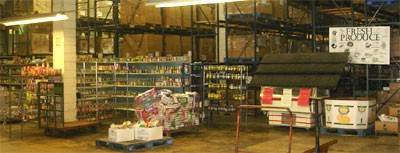
The CAFB had been struggling with a shortage of space inside its 48,000-sq.-ft. (4,320-sq.-m.) warehouse in northeast Washington (pictured).
"We had been looking everywhere for space," Smith says. "We had investigated space at some of the groceries in the area as well as leasing space." But nothing panned out, due in part to the CAFB's flagging finances. The food bank depends on donations; and in today's economy, that's a much more shallow well. Total donations are down almost 20 percent, CAFB officials report; and corporate and foundation donations, which account for about 85 percent of total contributions, are down by 30 percent. In short, the food bank's situation was pretty dismal. 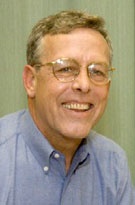
CAFB Chief Operating Officer Brian Smith
As a result, more needy people are getting nourishment. "It's great that NPR is doing this," Smith says from Washington. "The space that they've donated has enabled the Taylor Street warehouse to free up space for more food, and it's improved the efficiencies of our system. We can now better manage and organize our inventory." 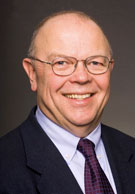
NPR interim CEO Dennis Haarsager
"It's a pleasure to open up our doors to the Capital Area Food Bank and play a role in supporting a community that NPR has been a part of since our organization was founded in 1970," NPR interim CEO Dennis Haarsager said as the organization turned the North Capitol space over to CAFB on Nov. 17th. "In these tough economic times, it's vitally important for individuals, businesses, and organizations to do what they can at any level to support their local communities." The Deals behind the Donation But there's another story behind NPR's generous gesture. Like most real estate deals, this one had its share of complications – all resolved through a combination of hard work, connections, and sharp attention to detail. The genesis of NPR's donation goes back to March of 2008, when the broadcasting giant bought the North Capitol Street building to redevelop as its future headquarters. As fate would have it, NPR's representative in buying that 146,000-sq.-ft. (13,140-sq.-m.) facility was the Washington office of Studley Inc. As further events unfolded, that brokerage would assume a central role in shepherding the gift of NPR's NoMa space. 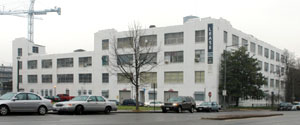
The food bank is occupying space inside this building at 1111 North Capitol Street that NPR bought in March of 2008 to redevelop as its future headquarters.
Studley's staffers had come honestly by their knowledge of the CAFB's needs. For many years, the brokerage's Washington employees have volunteered at the food bank, as well as supporting other local charities like the Juvenile Diabetes Research Foundation, the Lombardi Cancer Center, the National Prostate Cancer Coalition and Toys for Tots. Helping the CAFB "was first nature," says Schindler. 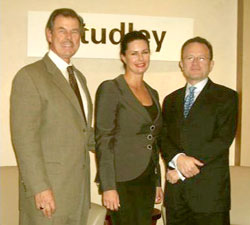
Studley's team working with NPR included (from left) senior brokers Vernon Knarr, Julie Rayfield and Art Greenberg. (Other team members not pictured were Angela Cordovez, Parker Lange, Adam Schindler and Colin Wheeler.)
"We immediately approached our client with the potential opportunity," Schindler recalls. "NPR's real estate team was very quick to help the food bank, clearly recognizing that the space donation was a win-win for all parties. Senior management buy-in was achieved very early during the process." HQ Redevelopment Deal Set Stage for Space Donation In early October, that issue was put to bed. NPR on Oct. 2nd entered an agreement to sell its current headquarters at 635 Massachusetts Avenue to Boston Properties, which will lease the property to NPR. Concurrently with the sale/leaseback, NPR contracted with Boston Properties to redevelop the facility at 1111 North Capitol Street. The NoMa site will now be converted into a 360,000-sq.-ft. (32,400-sq.-m.) complex, with occupancy scheduled for 2012. But part of the old building will survive as well – a fitting outcome for a structure that the Smithsonian Institution most recently used for a storage facility. NPR plans to maintain 78,000 sq. ft. (7,020 sq. m.) of the original historic structure, integrating the facility's façade with a new 10-story tower. 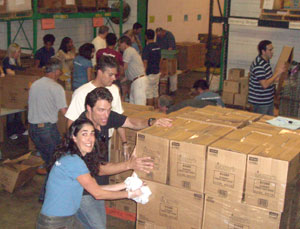
A team of Studley volunteers is pictured while working at the CAFB's Taylor Street warehouse in July.
That deal nailed down the final plank setting the stage for NPR's gift. "Both transactions were advanced concurrently," Schindler says of the CAFB donation and the two-pronged Boston Properties deal. "But NPR felt more comfortable completing the sale/redevelopment arrangement before the CAFB began using the building." Space Ready to Roll, As-Is 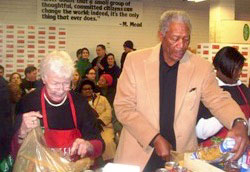
Well-known visitors to the Capitol Area Food Bank have included actor Morgan Freeman (photo above) and President and First Lady George W. and Laura Bush (photo below).
Photos: CAFB 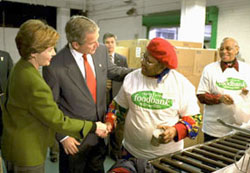
The food bank's move-in was blessedly uncomplicated. "One of the great things about this entire project was that the CAFB was able to occupy the space as-is, with very little modification," Schindler explains. "Since NPR's new headquarters at 1111 North Capitol is a former telephone warehouse, the loading docks and high ceilings worked out perfectly with CAFB's intended use." "The process has been easy," food bank COO Smith says of moving his organization into the space. "They are not charging us for utilities, either." A year from now, however, the food bank may again face an uneasy space situation. By then, the agreement with NPR will have ended, and Boston Properties will be working on redeveloping the NoMa space. The CAFB did break ground in late October on a new distribution center that's more than twice the size of the Taylor Street warehouse. That new facility, however, won't open until 2010. Nevertheless, that uncertain future doesn't negate what's happening right now. NPR's space donation has still stirred up a wee bit of magic, leaving the world a little better place. More food is getting to more hungry people. So yes, Virginia, there's your proof. There really is a Christmas gift that keeps giving. It lives in the nation's capital. And it's still giving as we speak, glowing like a silver star atop a Christmas tree, throwing a little light out across this holiday season.
 PLEASE
VISIT OUR SPONSOR • CLICK ABOVE PLEASE
VISIT OUR SPONSOR • CLICK ABOVE 
|
||||